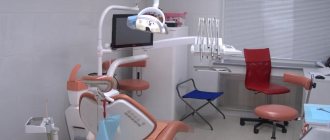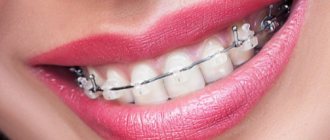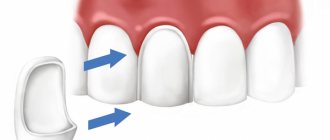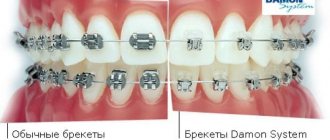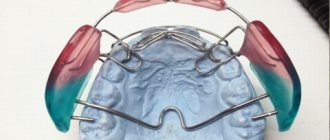During pregnancy, a woman has many restrictions on taking medications, as well as on performing certain medical and cosmetic procedures. Is it possible to get braces during pregnancy? Will wearing them harm the health of the unborn baby? Let’s find out what experts think about this issue.
In this article
- Is it possible to get braces for pregnant women?
- Pregnancy occurs while wearing braces - what to do?
- Braces and pregnancy: hygiene and safety recommendations
- Reasons why braces are not recommended during pregnancy
During the period of bearing a child, significant changes occur in the body of a pregnant woman. Hormonal levels fluctuate quite strongly, and internal systems begin to adapt to the new state. Changes also occur in the teeth. The expectant mother needs to receive a sufficient amount of minerals (including calcium) - as they say, for two, especially at a time when the fetus is developing a skeleton. If the required number of elements is not enough, the child begins to “borrow” them. This is why pregnant women’s nails and hair often become brittle and their teeth begin to crumble. Due to general hormonal changes, the gums are also prone to increased sensitivity and may become inflamed. The remineralizing ability of saliva changes, which also leads to weakening of dental tissue.
Due to these processes, current dental diseases, such as caries, begin to progress rapidly. Therefore, pregnant women are advised to undergo oral treatment at the initial stage if there are any problems. In general, most experts are of the opinion that it is not advisable to install braces during pregnancy. But they also have opponents on this issue. Let's look at the arguments for and against.
Is it possible to get braces for pregnant women?
During pregnancy, hormonal disorders occur in the female body, which lead to a deterioration in the nutrition of the roots and periodontium of the teeth. Such changes contribute to the softening of bone tissue. A number of experts believe that it is impossible to install a braces system during this period, since this can lead to incorrect positioning of the teeth during treatment.
There are other reasons why it is not recommended to correct the bite at this time:
- Installing a braces system is an unpleasant event that can cause additional worries and stress, which is undesirable during such a crucial period for a woman.
- Correcting your bite requires systematic visits to the orthodontist and constant monitoring of the condition of your teeth and gums. In order for teeth to move in the required direction, braces must be adjusted in a timely manner. A woman during pregnancy may feel unwell or be hospitalized, resulting in her missing a scheduled visit to the dentist.
- During pregnancy, all reserves of a woman’s body are used for the growth and formation of the fetus, which often leads to the loss of minerals, including calcium. Against the background of a deficiency of this microelement valuable for bone tissue, it is difficult to predict the condition of the teeth and the final result of treatment.
Before the planned correction of the bite, a woman needs to take several x-rays, and this can harm the health of the expectant mother and child. Experts recommend not resorting to such a procedure unless absolutely necessary.
However, gestation period is not an absolute contraindication for installing braces. But the decision about such treatment requires an individual approach. The doctor can answer the question whether it is possible to install braces during pregnancy only after conducting all the necessary examinations of the patient.
If the tests are good and the body is in satisfactory condition, the installation procedure is carried out using the latest technical and therapeutic means that are specially designed for pregnant women.
When a woman plans in advance to install a structure to correct her bite, she needs to adhere to the following recommendations:
- carry out dental treatment and remove stones before conception;
- take all x-rays in advance;
- carefully adhere to hygiene standards for oral care, and later, properly care for braces while wearing them.
If the structure was installed just before conception, the decision on further treatment should be made by a specialist, taking into account the condition of the body, teeth and gums.
When pregnancy occurs a couple of months before the end of treatment, there is no need to remove the braces. If the bite has been practically leveled, undesirable changes are unlikely to occur at the final stage.
At a consultation with an orthodontist
The orthodontist, in addition to crowded teeth and crossbite on the left, drew the patient’s attention to another problem: a lost chewing tooth. To normalize the bite, it is necessary to restore the integrity of the dentition. Restoring the tooth will prevent the remaining teeth from shifting to the place of the missing one and will allow for the creation of correct interdental contacts. The best restoration method in this case would be dental implantation. You need to plan prosthetics before starting orthodontic treatment, taking into account the wishes of the orthopedic surgeon. It is the orthopedist who must tell you how much space is needed to install the implant and crown. At the Dial-Dent clinic, such cases are solved comprehensively; orthodontists and orthopedists work in close cooperation.
After a comprehensive diagnosis, including consultations with a psychologist and osteopath, orthodontist O.A. Baranova offered a choice of several braces systems that are suitable for treatment. The patient chose Damon braces - Damon Clear braces (on the upper jaw) and Damon Q braces (on the lower jaw). Ceramic braces look the most aesthetically pleasing and attractive.
Pros and cons of wearing braces during pregnancy
Such treatment during this crucial period for a woman is influenced by a number of factors. Therefore, to answer the question of whether it is possible to wear braces during pregnancy, it is necessary to take into account both all the positive aspects and risks.
Among the positive aspects of wearing braces at this time:
- the ability to quickly correct teeth by softening bone tissue;
- a more comfortable psychological state of a woman when wearing a structure in her mouth, because during the period of bearing a child she visits public places less often and communicates less with other people.
Negative effects on the body prevail due to the following factors:
- accelerated destruction of enamel and rapid development of caries;
- the need to regularly visit the dentist;
- tooth loss, their destruction as a result of structural pressure;
- peeling off bracket units caused by dry enamel;
- development and treatment of gingivitis and treatment of periodontitis, which contribute to loosening of teeth.
A pregnant woman should control her diet, excluding viscous and hard foods, which are prohibited while wearing braces. If severe pain occurs during bite correction, only a limited amount of painkillers can be used.
To prevent tissue chafing while wearing the structure, doctors recommend using special wax. But there is a possibility that a pregnant woman may be allergic to this substance.
Women also often experience toxicosis during pregnancy. If a metal brace system or another type of braces has been installed recently, it can cause great inconvenience to the expectant mother.
Pregnancy is not a disease, but a special state of the body
- It is no secret that a developing fetus needs various microelements from the mother’s body, including calcium, the basis of bone tissue. Therefore, expectant mothers are prescribed special vitamin preparations with supplements of vital microelements and are recommended to adhere to a special diet.
- However, due to changes in hormonal levels, the bone tissue softens and becomes more pliable, and the teeth acquire previously unusual fragility and increased sensitivity.
- In addition, many women experience so-called pregnancy gingivitis, caused by metabolic disorders and toxicosis. The gum tissue becomes inflamed, bleeds and grows noticeably.
Absolute contraindications
There are a number of restrictions for wearing braces during pregnancy. They cannot be installed if:
- systemic diseases caused by disorders in the immune, cardiovascular, endocrine or hematopoietic system;
- pathologies associated with problems of healing and restoration of bone tissue;
- a number of neuropsychiatric disorders.
In each individual case, the final decision on treatment is made by a specialist.
Conservation of orthodontic therapy - an alternative solution
If it was decided to remove the bracket system for medical reasons, then it is possible to preserve the already achieved result, i.e., “preserve” it. The preservation method involves the patient wearing special transparent aligners made of medical silicone on her teeth. They will have to be worn until therapy is resumed. Mouthguards are made individually, based on the characteristics of the bite.
Rules for wearing braces
When correcting a bite during pregnancy, the expectant mother must adhere to the following rules:
- Carefully monitor oral hygiene so as not to provoke the development of an inflammatory process.
- Use pharmacological drugs that help strengthen tooth enamel, for example, fluoridation of teeth.
- Follow a special diet that includes foods that replenish the supply of vitamins and minerals in the body.
- Visit your dentist regularly to adjust treatment in a timely manner and prevent the occurrence of dangerous changes and disorders.
If undesirable complications develop when wearing braces during pregnancy, a specialist can remove the structure in time, and in order to record the result already obtained, resort to the help of safe aligners that are placed on the teeth.
After giving birth, you can reinstall the braces and continue treatment.
Orthodontic treatment
Any orthodontic treatment begins with fixing braces on the teeth:
Next, the patient had to visit the orthodontist once every two months. At these meetings, the doctor checks hygiene, changes or installs additional equipment, and explains how the treatment is progressing.
Intermediate stages of orthodontic treatment:
Added equipment to create space for prosthetic replacement of a missing tooth:
A very important stage is wearing orthoelastics, special rubber bands that improve contact between teeth. At this stage, much depends on the patient’s organization.
Braces care
The procedure for caring for braces for pregnant women has its own characteristics. You should be more responsible about hygienic measures aimed at cleaning the structure, teeth and gums.
To eliminate the risk of complications, you should be sure to brush your teeth after every meal. Experts recommend spending at least 10 minutes on this. Cleans the surface of the teeth both from the outside and from the inside.
Cleaning is carried out using a special brush with V-shaped bristles. To efficiently remove food debris in the interdental spaces and from the braces, special brushes and dental floss are used.
Orthodontists often recommend using sprays that clean the mouth and improve blood circulation in the gums.
Toothpaste should also be chosen on the recommendation of a doctor.
After brushing your teeth, the mouth should be rinsed thoroughly for 2-3 minutes. The doctor's consultation
The result of treatment with braces
Treatment results: the state of the bite and the position of the teeth are normalized. The site has been prepared for the planned dental implantation.
The last, retention, stage of treatment begins after the braces are removed and is aimed at maintaining the achieved result. A non-removable retainer is installed on the bottom of the teeth, and a mouth guard is made for the upper teeth to be worn at night.
Orthodontic treatment lasted 14 months. The cost of treatment was 205,700 rubles (prices at the time of treatment).
See other examples of orthodontic treatment at Dial-Dent here.
Make an appointment for a consultation by phone +7-499-110-18-01 or through the form on the website. You can ask questions about correcting your bite to the chief doctor of the clinic, Sergei Vladimirovich Tsukor, at
What is the best thing to do before pregnancy?
Even one pregnancy and breastfeeding of one child can trigger the occurrence of caries or periodontal disease. The risk is much higher if you have twins or two children with a small age difference. Carrying a child requires a lot of the body's resources, and although the doctor may recommend mineral supplements, they are not able to compensate 100% of the losses. Therefore, the strength of the enamel of teeth and their roots is reduced. If there has been no caries, there is a risk that it will appear; if it has already happened, it can quickly develop to the 3-4th stage, and the installed fillings will begin to fall out due to weakening of the tooth tissues.
Therefore, ideally, before planning a pregnancy, it is worth treating all teeth, replacing old fillings, and strengthening the enamel - remineralization. If you have inflammation of the gums, then be sure to undergo treatment to prevent the development of periodontal disease.

